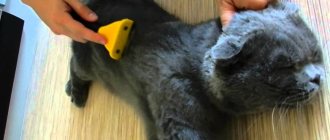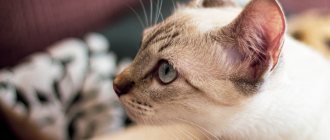An Arsenal of Cats' Unloved Smells
Despite developed vision, the sense of smell is also important for furry pets. Thanks to the ability to distinguish smells, cats are perfectly oriented in their surroundings, mark their territory and communicate with each other.
All odors surrounding your pet can be divided into several categories:
- Pleasant. So, the smell of sweat on the owner’s clothes calms the cat, she knows that he is nearby. Catnip and valerian excite, as they are similar to the hormones of furry pets. Also read about grass for cats.
- Repelling - any strong aroma has a repulsive effect, and there is a direct dependence on the intensity - the higher it is, the more unpleasant the smell.
Using this feature, you can use different scents to teach your cat good manners or wean them from bad ones.
Products are herbal or artificial based.
Also read: Why cats are afraid of water.
Plant-based sources of unpleasant odors
Such means include:
- Garlic and onion cloves. They secrete phytoncides that irritate the nasal mucosa, which forces the animal to move as far as possible from the source of the unpleasant odor. To enhance the effect, it is recommended to finely chop or grind to a paste-like consistency. Prepared portions of onions and garlic should be placed in places that are subject to “attacks” from your pet. But it is important to consider that the aroma from these products is strong and will be noticeable not only to animals, but also to people. As the specific odor disappears, it is worth replacing with a fresh portion.
- Any spices: cinnamon, coriander, pepper, curry, etc. make your pet want to run away. They can be used in several ways: rub surfaces or make a mixture based on them. Add 1-2 teaspoons of spice to 200 ml of water, stir and spray on areas that need protection from animals.
- Oil from the leaves of the rue bush works well to repel furry pets. A few drops applied to problem areas will help in weaning from bad habits.
- Many essential oils have similar effects. Lavender or rosemary based oil applied to surfaces will repel the animal.
- All citrus fruits (orange, lemon, tangerine, etc.) will help cope with your cat’s bad habits. The smell of lemon is especially unpleasant for them, but the rest are difficult to tolerate. You can also add juice to water and use a spray bottle to treat surfaces or place fruit slices in the right places. The animal will avoid them.
- The smell of coffee is also hated by cats, which can be used to your advantage.
To eliminate the unpleasant odor and wean the animal from shitting in inappropriate places, you can use a combination of some of the above remedies.
For example, pour lemon juice over coffee grounds or sprinkle with essential oil and place in the right place. Living lavender or rosemary plants placed on the windowsill will wean your pet from spoiling other plants nearby.
Perfumes and special products
Any product from the perfume industry, be it expensive perfume or cheap deodorant, has an equally repulsive effect on cats. The stronger the smell, the more disgust it causes. If the composition contains the aroma of citrus or lavender, this will enhance the effect.
Vinegar is extremely unpleasant for cats; you can add 2-3 drops to water and wipe the surfaces that need protection. People will not feel a special aroma from such a concentration, but this will be enough to scare away the animal.
Pet stores provide a fairly wide range of factory-produced sprays and liquids to wean cats from bad habits. For example, the spray “Repel? Yes!" or "Biovax". They contain special fragrances and enzymes that help in the fight against pet leprosy.
Also read the article: Antigadin for cats.
The importance of olfactory biocommunication
The most common method of communication in the animal world is chemical. Animals can communicate using secretions of odorous glands over long distances and almost unlimitedly in time. The smell bends around obstacles and is clearly audible at night, when vision cannot help.
The smell signals readiness for mating; with its help, the animal senses the gender of the partner even at a considerable distance. Pheromones vary depending on social status - the leader of the pack smells completely different than a cub or an ordinary member of the group. Mutual sniffing helps prevent conflicts, reduce aggression, and maintain the number of sexually mature males.
For cats, the sense of smell is no less important than for other animals. With its help, the pussy determines the edibility of objects, searches for food, and respects the boundaries of the territory. The world of a cat is an ocean of odors varying in quality, strength, and stability. Many signal volatile substances (pheromones) are evolutionarily conservative - the same or even identical for different animal species.
Consequently, many pungent odors that are unpleasant to humans are also disgusting to pets. But there are also those that are unpleasant to us, but have a fascinating effect on a furry pet. By knowing the “language” of scents, you can control your cat’s behavior.
How to use “aromatherapy” to rid entryways of cats
If there is a street cat in the entrance, then it causes a lot of problems. Among the most common are: an unpleasant odor from the animal’s urine and feces, “screams” in the middle of the night and the rotting remains of half-eaten food. But you can get rid of uninvited guests in the form of cats using their dislike for certain scents. They evoke in animals an instinctive feeling of danger, anxiety and fear, forcing them to get out of their favorite entrance.
Essential oils and vinegar can best help with this. Since the entrance is a fairly large area, it will be more convenient to treat it with liquid.
To prepare it, take water and add a few drops of vinegar or any essential oil (preferably lavender or citrus), pour it into a spray bottle and spray it on the walls and floor of the entrance.
This will get rid of uninvited residents.
Industrial products and sprays
The industry offers a wide range of cat repellent products. Most of them are made on the basis of perfume compositions. Basically, such means have a deterrent effect, but there are also soothing means for litter box training.
As a rule, they are effective, but they may not be suitable for a particular animal: they may not have an effect if the specific smell does not cause rejection in the cat, cause allergies, and so on.
Before using industrial or homemade repellents, make sure that the animal is healthy and establish chain of command within the family. Without solving these problems, the situation with odors cannot be solved. Otherwise, repellents will be excellent helpers in establishing life with a cat in the house.
Repelling cats when they defecate on the bed
Pets bring not only joy to their owners, but also inconvenience, starting to “misbehave” in the apartment, for example, by choosing a secluded place in the bedroom that is not intended for the toilet.
Before you start weaning your animal from such an unpleasant habit, you need to find out why it does it. Among the main reasons for this behavior are:
- Protest. When a pet is scolded or punished for something, it develops stress, and with such behavior the animal shows its disagreement.
- If there are problems with the genitourinary system, the act of emptying the bladder can be painful and the cat looks for a more comfortable and soft place for the toilet.
- Young kittens are often afraid to get out of bed on their own or do not remember where the toilet is, which leads to bowel movements in the bed.
- Some especially clean individuals do this when their tray is full; you should pay attention to the regularity of changing the filler in it and the problem will be solved.
- Cats whose owners are rarely at home or pay little attention to them begin to get bored and try to attract attention and diversify their lives with this behavior.
- Many elderly pets, having lived in a family for a long time, suddenly begin to shit on the bed. This is not due to a deterioration in character, but to the aging of the body; the animal could simply not have time to reach its tray in time.
- Cats are terrible owners, and the bed smells like the owner; by peeing on it, they mark their territory.
Dealing with “indecent” pet behavior
Having understood the reasons for this behavior of your pet, it is much easier to understand what motivates him at the moment of dirty tricks and begin to fight it. In order to minimize stress, you should be more attentive to the animal, caress it, and play more. Keep the toilet clean and wash it more often, install additional trays with other types of litter.
You can use essential oils or wash clothes with a fabric softener that has a lavender or citrus scent. But it is worth considering that not only people, but also animals have allergic reactions, so you should use the products carefully. A few drops of oil can be applied to the bed frame.
It is possible to wean an animal from the bad habit of relieving itself on the bed with the right tactics.
What are the reasons
A cat is a graceful animal, whose distinguishing feature is considered to be an excellent sense of smell. The vomeronasal organ (Jacobson's tube), which is located at the base of the oral cavity, smoothly passing behind the front teeth, is responsible for the animal's excellent sense of smell. Such a tube is capable of perceiving any odors and transmitting impulses to the olfactory areas of the brain.
© shutterstock
Despite the fact that a furry pet is a kind and affectionate friend for its owner, it remains a predator whose genetic ability is to track and capture prey. Therefore, smells are very important information for such an animal. With the help of such information, animals are able to get used to their surroundings, communicate and delimit territory.
And sometimes this may not seem entirely clear to the potential owner of the animal; many cat behaviors can be controlled by addressing the pet in the language of smell. Such “words” can be divided into the following points :
- smells that repel pets;
- scents that attract them.
But, first of all, it is important for the owner to instill in the pet respect for prohibitions, therefore repellent aromas are most relevant.
Mr. Cat warns: danger to people
Rut oil is an effective remedy in the fight against bad habits of cats. But you need to know that if it is used in excess, the owners may experience unwanted reactions from the skin:
- development of allergic scabies;
- the appearance of urticaria;
- signs of allergic dermatitis.
When using this oil, you should adhere to the rule - the less, the better.
Physiology of the cat's sense of smell
The odors that a cat encounters determine its behavioral reactions, having a direct impact on the nervous system. Therefore, many changes in the mood of pets, which people cannot explain, lie in a new smell that attracted the cat’s attention. This smell can cause both contentment (the cat suddenly begins to purr and rub against its legs), and sudden aggression or nervousness.
A cat's mood can change radically when encountering a new smell.
Specific irritants of the olfactory system have the following effects on cats:
- increase/weaken sexual desire;
- increase/suppress appetite;
- activate/deactivate basic instincts;
- influence the psychophysiological status.
The sense of smell plays a special role during sexual hunting.
Be aware that when using strong-smelling products, you damage not only your pet’s sense of smell, but also the nervous system. By inaccurately using strong “fragrances” to correct behavior, you can disrupt your pet’s appetite, cause insomnia and previously uncharacteristic anxiety attacks.
When influencing your cat's behavior with odors, be prepared for unexpected results.
In no case should scaring away an animal using smells become the main way of communicating with it. It is permissible to use this measure in extreme cases, when any attempts to negotiate end in failure. Long-term exposure of a cat to powerful aromas can lead to bad consequences, including pathologies of the nervous system and disorders of the brain.
How to protect plants from cats
When cats mark territory, a special secretion is released along with urine, which, when it gets on the leaves of plants and flowers, spoils them. Many animals like to sleep in beds and flower beds and organize a toilet there, digging up the soft soil. This causes a lot of grief to owners of plots and gardens. Scratched tree trunks don't add joy either. But it is possible to fight such hooligans. It is enough to plant along the edge of the plot or on the windowsill where there are flowers, onions or garlic.
Ornamental plants will also come to the rescue. For example, lavender, which will not only repel cats, but will also decorate the area.
1111
Prerequisites for the development of an acute sense of smell in cats
It is well known that a sensitive sense of smell is one of the strengths of felines. The ability to track their prey by the scent it emits has been developed by wild cats for centuries, so that it can be passed on to our pets in finished form. Unlike humans, who often rely on their eyesight, the most developed feline skills include smell and touch.
In natural conditions, a keen sense of smell allowed cats to survive in conditions of food shortage
This choice is explained by natural necessity. To clarify it, it is necessary to turn to the wild ancestors of our pets. Wild cats preferred to hunt at night - this rule applied to both forest and desert felines. This way they avoided the watchful gaze of larger predators, and gained superiority over their prey, having the ability to identify it by smell over long distances and take the animal by surprise.
In the cold months, a keen sense of smell saved Amur cats from starvation
Amur forest cats are able to smell birds buried under several layers of snow thanks to their developed sense of smell. This skill allows them to survive the harsh Siberian winters.
Impact of infant blindness
The predominance of smell over all other ways of cognition of the environment is also explained by infantile inclinations. Kittens are born blind, so from the first days of life they are faced with the question of effective orientation in space.
Kittens are forced to learn how to survive even before their eyes open.
Kittens are saved from confusion and complete defenselessness by their tiny noses, with which they are already able to smell their mother’s scent, distinguishing it from hundreds of others. Consequently, kittens get to know both their parents and brothers and sisters primarily by smell.
conclusions
So, we figured out what smells cats don’t like. Cunning is a good way to avoid war. In this case, wars with cats constantly visiting objects that they need to beware of, so that the owner associates the pet exclusively with positive things.
What conclusions can be drawn?
- The most universal remedy is citrus fruits. This is the smell that repels cats with a 100% guarantee. If you put a lemon peel near a certain place, the cat will stay away from it.
- Although onion, garlic and vinegar are effective, it is best not to use them. Although the latter can remove the smell of cat urine.
So we figured out what smell cats don’t like. Good luck with your pets.
Citrus
For humans, the smell of lemons, grapefruits and oranges is a hundred times more pleasant than the “fragrance” of garlic, but for some reason cats really don’t like the citrus aroma. Fresh orange peels laid out on the windowsill between flower pots completely discourage cats from digging in the ground, and spraying upholstered furniture with water and some citrus essential oil prevents pets from encroaching on these home furnishings.
Cats can't stand the smell of citrus fruits.
The smell of citrus fruits is so unpleasant for cats that especially smart tailed pets only need to splash juice from a fresh lemon peel into their faces a couple of times at the moment when they sharpen their claws on the sofa, for them to learn their lesson and stop such entertainment forever.
Lavender.
Cats (like many people) love the scent of lavender.
It attracts cats, causing them to sniff and rub against objects with this smell. However, the attractiveness of this smell is significantly inferior to the previous ones, so cats often do not show much interest in it, and some even avoid this plant. If you have one of those cats that loves the smell of lavender, you can use lavender oil to improve the cat's environment and add a sense of confidence. It has been found that using this natural scent for therapeutic purposes, especially in cases of anxiety and mild aggression, along with other relaxing factors (and addressing the cause of the problem), helps the animal feel much calmer.
Olives.
Another scent that cats adore comes from the olive tree. Its smell also has a narcotic effect that changes the cat's behavior. The reason for this phenomenon is that olive trees secrete an active substance contained in their trunk and leaves - oleuropein.
(oleuropein). Similar to catnip, the scent of olives causes the cat to rub, lick, eat leaves, show arousal, and engage in pre-mating-like behavior.
Some cats are attracted only to the scent of the leaves, while others are attracted to all parts of the olive tree and even the finished products, from olives to olive oil. There is still no published scientific evidence that the smell of olives has a relaxing effect on cats, but it certainly affects the central nervous system, making them more active and playful.
Safety regulations
The list of smells that can scare away a cat is quite long. Some of them are safe for animals, while others are very harmful. Therefore, you need to carefully ensure that the cat does not inhale particles of ground pepper or coffee and does not come close to household chemicals. You also need to be careful with vinegar. In small quantities it is not harmful, but in certain doses it can cause burns.
Keep in mind that your cat may be allergic to certain substances. If you notice strange symptoms, you need to remove the source of the odor and contact a veterinarian.
( 1 ratings, average: 5.00 out of 5)











